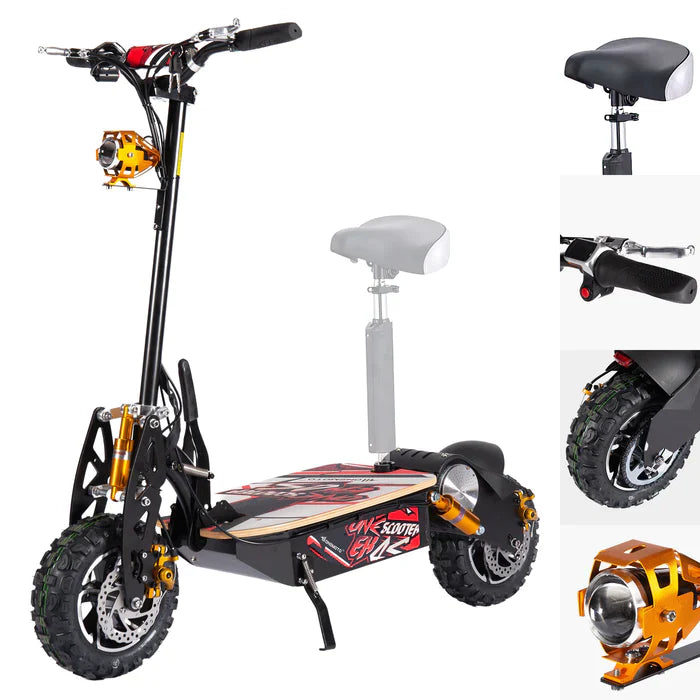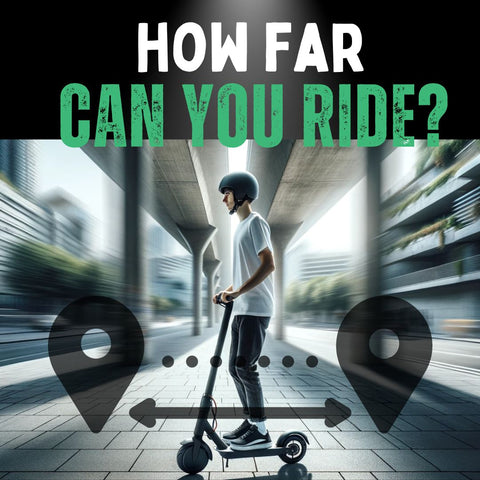Updated: 13.3.25
Electric scooters have gained significant popularity as a convenient and eco-friendly mode of transportation in recent years. However, the question of their legality on UK roads remains a subject of confusion and debate.
As we enter 2025, it is essential to understand the current state of regulations surrounding electric scooters in the United Kingdom. 
In this article, we will explore the latest developments in electric scooter legislation, shedding light on the rules and restrictions governing their use.
Join us as we unravel the intricacies of electric scooter legality and discuss their potential future in the UK transportation landscape.
Current Legal Status of Electric Scooters in the UK
Buying and Owning Electric Scooters
In 2024, you can legally buy and own electric scooters in the UK. From compact models for casual rides to heavy-duty ones for longer commutes, there is a myriad of electric scooters available on the market. However, the rules for their use are not as straightforward.
Where You Can Legally Use Electric Scooters
In the UK, electric scooters can only be used on private land with the landowner's permission. However, there are e-scooter rental schemes in more than 30 areas, including London, Newcastle, Bristol, and Bournemouth (2).
To use a rental e-scooter, you must have a full or provisional UK licence for categories AM, A, or B, which includes entitlement for category Q (3).
The maximum speed limit for rental e-scooters is 15.5mph (24.9km/h), while privately-owned e-scooters can reach up to 68 mph (110 km/h) (2).
Currently, there is no specific law for e-scooters, and they are recognised as "powered transporters" under the same laws and regulations as motor vehicles (2). The Transport Committee of MPs has called for e-scooters to be legalised on roads but not pavements (2).
Differences between Private and Rental E-Scooters
| Aspect | Privately Owned E-Scooters | Rental E-Scooters (Government Trials) |
|---|---|---|
| Use on Public Roads | Not Allowed | Allowed |
| Use on Pavements | Not Allowed | Not Allowed |
| Use on Cycle Lanes | Not Allowed | Allowed |
| Use on Private Property | Allowed with permission | Allowed with permission |
| Licence Requirement | N/A | Category Q entitlement on a driving licence |
| Insurance Requirement | N/A | Covered by rental operator |
| Helmet Requirement | Recommended | Recommended |
The E-Scooter Trials in the UK
Government Trials
The UK government is running trials of electric scooters (e-scooters) in various districts across the country to gather data and inform decision-making (12).
The trials are being conducted in 31 different counties and unitary authorities, including Essex, Birmingham, and other major urban locations(34).
The trials are being extended until at least the end of May 2024 (35).
The Department for Transport (DfT) is gathering data on the technology and its impact on public space, and is working closely with disability groups to fine-tune the operation model (3).
It is important to note that trial e-scooters are legal as long as riders stick to the road and have at least a provisional UK driving license, but it is illegal to use privately-owned e-scooters in any public place (31).
E-Scooter Rental Operator Trials
The government has partnered with various e-scooter rental operators for these trials.
The trials allow people to rent and ride e-scooters in designated trial areas, providing practical insights into how e-scooters can be integrated into the existing transport infrastructure.
Trial Areas
The trials are taking place in various regions across the UK, turning them into testing grounds for e-scooters.
The data collected from these trials is expected to play a crucial role in shaping the future of e-scooter regulations in the country.
Related: Electric Scooter Buyer's Guide - UK Buying Guide - What YOU Need To Know

Safety and Guidelines for E-Scooter Users
Travel Safely
Whether you're participating in a trial or riding on private land, safety is paramount.
Adhering to safe travel guidelines, such as following traffic rules, not exceeding
the speed limit, and being aware of other road users, can help ensure a safe ride.
Also, as a rider, it's important to be considerate of pedestrians and other vehicles on the road.
Safety Rules
Each e-scooter rental operator participating in the trials sets out safety rules for their users.
These rules typically include age restrictions, speed limits, and areas where you can and cannot ride.
Helmets and Clothing
While there may not be a legal obligation to wear a helmet when riding an e-scooter, it is highly recommended.
The right safety gear, including a helmet and appropriate clothing, can significantly reduce the risk of injuries if an accident were to occur.
Related: How Far Can I Ride My E-scooter?
Licensing and Insurance for E-Scooters
Licensing Guidance
For the ongoing trials, users need to have a valid driving license. This rule has been set in place to ensure that users have a basic understanding of road rules before they start using e-scooters.
The license requirements vary depending on the trial area and the e-scooter rental operator.
Insurance for E-Scooters
The insurance coverage for e-scooters during the trials is typically provided by the rental operators.
However, once the use of privately owned e-scooters becomes legal on public roads, it's likely that riders will need to have their own insurance coverage.
| Aspect | Current Regulation (as of 2024) |
|---|---|
| Use on Public Roads | Illegal for privately owned e-scooters. Rental e-scooters from official trials are allowed. |
| Use on Pavements | Illegal for all types of e-scooters. |
| Use on Cycle Lanes | Illegal for privately owned e-scooters. Rental e-scooters from official trials are allowed. |
| Use on Private Property | Allowed with the landowner's permission. |
| Licence Requirement | Category Q entitlement on a driving licence is required for rental e-scooters from official trials. |
| Insurance Requirement | Insurance coverage is typically provided by the e-scooter rental operator during trials. |
| Helmet Requirement | Not legally required but highly recommended. |
| Penalties | Riding an e-scooter illegally can result in a Fixed Penalty Notice with a £300 fine and six penalty points on the license. Riding without the correct license can result in a fine of up to £100 and three to six penalty points. If the case goes to court, the offender could receive an unlimited fine and be disqualified from driving. |
Please note that these regulations are subject to change and may vary depending on the trial area and the e-scooter rental operator. Be sure to check the latest guidelines before using an e-scooter.
Road Regulations for E-Scooters
Rules of the Road
Just like any other vehicle on the road, e-scooters come with their set of rules.
For instance, riding on pavements is generally prohibited, and riders are expected to adhere to the same traffic regulations as cyclists.
Using E-Scooters in Cycle Lanes
Currently, it is illegal to use e-scooters in spaces set aside for pedestrians, cyclists, or horse-riders, including pavements and cycle lanes in the UK (12).
However, the UK government is running trials to test the use of e-scooters in certain areas (34).
According to Sustrans, if e-scooters are legalised for use on cycle lanes, they should be limited to a maximum speed of 15.5 mph and should not be allowed on shared-use paths (5).
Future of Electric Scooters in the UK
The UK Government’s Plan
The UK government is planning to legalise privately owned e-scooters for use on public roads and cycle lanes.
Although the exact date of implementation is not known, the move is expected to revolutionise personal transportation in the country.
Impact on Public Roads and Private Land
The legalisation of e-scooters on public roads will certainly lead to a shift in how we use our roads.
It is anticipated that there will be clearer guidelines on where e-scooters can be ridden, both on public roads and private land.
This is likely to make e-scooters a more viable and attractive mode of transport.
In Summary
While electric scooters are not yet fully legal on public roads in the UK, the trials and planned changes show that the government is taking steps towards legalisation.
As we wait for these changes, it's crucial for riders to follow existing rules and safety guidelines to ensure a safe and enjoyable ride.
FAQs
Requirements for Riding an Electric Scooter on UK Roads
As of May 2023, it is illegal to use privately owned electric scooters on public roads, pavements, cycle lanes, cycle paths, or other public spaces in the UK. However, rental e-scooters are allowed on public roads as part of government-backed trials. To use an e-scooter from an official trial, you need to have category Q entitlement on your driving licence. Additionally, you can use electric scooters on private property in the UK, but you must ask for permission from the landowner first. There is no specific law for e-scooters, so they are recognised as "powered transporters" and are subject to the same legal requirements as motor vehicles, including MOT, tax, licensing, and specific construction.
Penalties for Riding an Electric Scooter Illegally in the UK
Riding an electric scooter illegally in the UK can result in penalties and fines. If you don't have the correct license or insurance, you could face a Fixed Penalty Notice with a £300 fine and six penalty points on your license. Riding without the correct license can result in a fine of up to £100 and three to six penalty points. If caught riding an e-scooter on a public road, you could face a fine of £300 and six penalty points on your driving license. If the case goes to court, you could receive an unlimited fine and be disqualified from driving, and your scooter could be impounded by the police.
Safety Guidelines for Riding an Electric Scooter on UK Roads
The safety guidelines for riding an electric scooter on UK roads include:
- Always ride solo, as e-scooters are not built for two people.
- Never ride under the influence of alcohol or drugs, or if you have medical restrictions or exceptions.
- Wear safety protection such as a helmet.
- Keep to the speed limit.
- Follow the specific safety requirements and legal requirements relating to e-scooters.
- Check for any additional safety guidelines provided by the local area hosting the trial.
Get in Touch 🚀
Loved our article on “Are Electric Scooters Legal on UK Roads” Got the itch to dive into more wheely-awesome info?
Whether you're a parent or a grandparent, we're here for all your kids ride-on toy questions! 🚗💨
Feeling click-happy?
Jump straight into our wonderland at RiiRoo.com.
Or, if you're more the chatty type, give our Live Chat a whirl and let's talk toys!






Share:
The Best Cars for 10-12 Year Olds to Drive in 2025
BMW F850 GS vs. Aprilia Tuono V4 - Which is Right for Your Child?